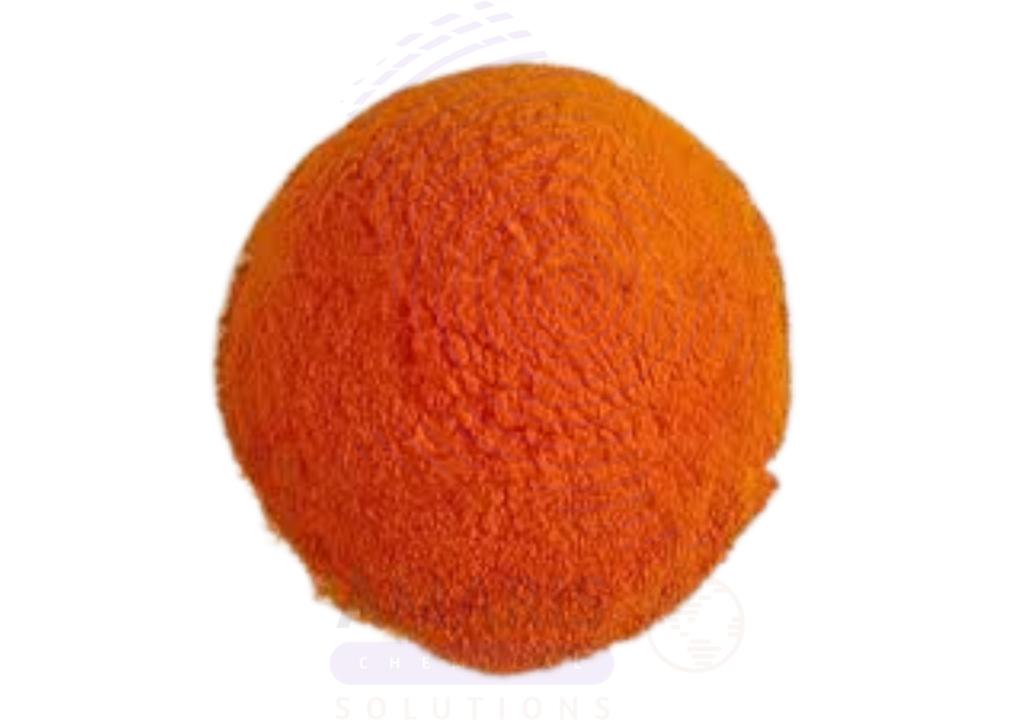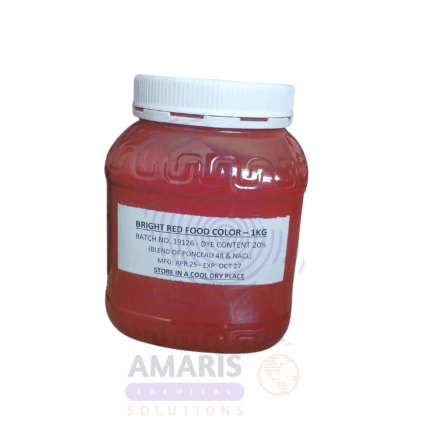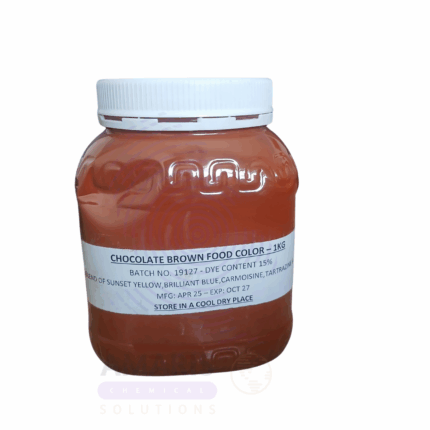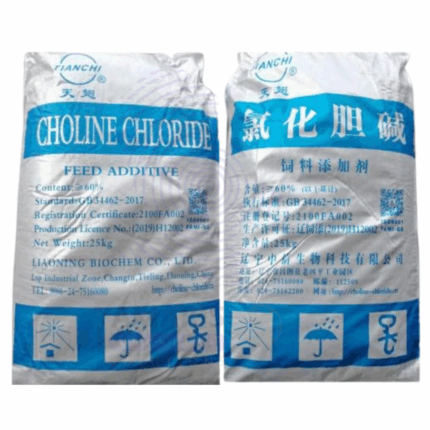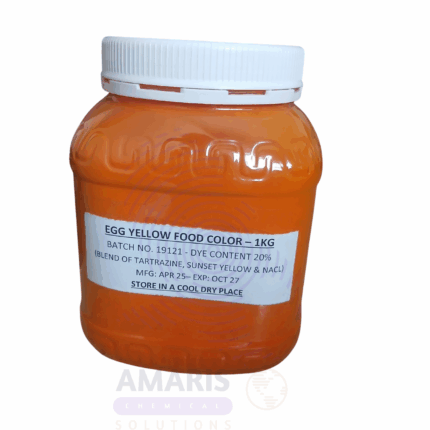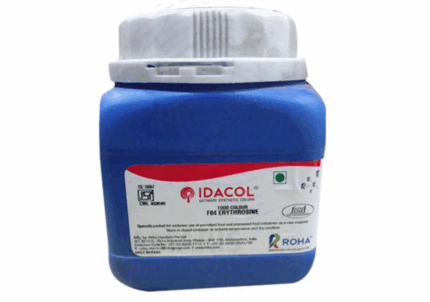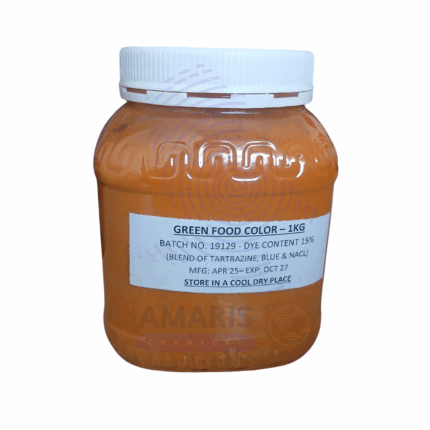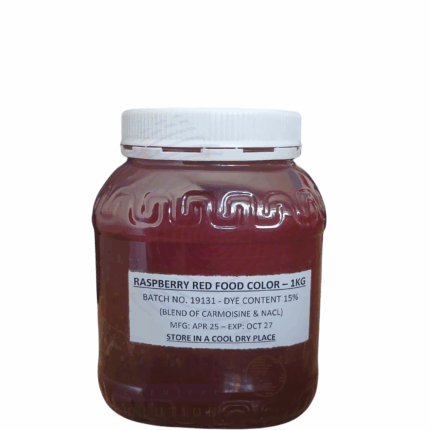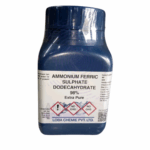
Ammonium Ferric Sulphate Extra Pure
$ 18.00 Original price was: $ 18.00.$ 17.45Current price is: $ 17.45.
Natural Beta carotene food grade
Whatsapp Order
Natural Beta Carotene Food Grade is a naturally derived carotenoid pigment obtained from sources such as algae, carrots, palm oil, and other vegetables. It is a powerful antioxidant and a precursor to vitamin A (provitamin A), essential for human health. This bright orange-red pigment is widely used as a natural colorant in food, beverages, dietary supplements, and cosmetics. Its antioxidant properties help protect cells from oxidative damage, supporting immune function, eye health, and skin vitality.
Description
Table of Contents
Toggle
Natural Beta carotene food grade
Primary Uses
- Food Industry
- Used as a natural colorant to impart an orange to red hue in dairy products, beverages, baked goods, snacks, and confectionery.
- Acts as a nutritional supplement ingredient to provide provitamin A.
- Added to margarine and cooking oils for vitamin A enrichment.
- Dietary Supplements
- Used in capsules, tablets, and soft gels as a natural source of vitamin A precursor and antioxidant.
- Promotes immune system support and skin health.
- Cosmetics and Personal Care
- Incorporated in skincare products for its antioxidant benefits and natural coloring.
- Used in lipsticks, creams, and lotions for pigmentation and skin nourishment.
Secondary Uses
- Animal Feed
- Added to poultry and fish feed to enhance pigmentation and improve animal health.
- Pharmaceuticals
- Used in formulations targeting eye health and immune support.
- Beverage Industry
- Employed as a natural colorant in fruit juices, energy drinks, and fortified waters.
KEY PRODUCT FEATURES
1. Basic Identification Attributes
- Chemical Name (IUPAC): Beta-Carotene
- Common/Trade Name: Natural Beta Carotene Food Grade
- CAS Number: 7235-40-7
- HS Code: 3204.17.00
- Synonyms: Provitamin A, E160a
2. Physical & Chemical Properties
- Physical State: Fine powder or crystalline solid
- Color & Odor: Bright orange-red; mild characteristic odor
- Solubility: Insoluble in water; soluble in fats, oils, and organic solvents
- Melting Point: 176–180°C
- Stability: Sensitive to light, heat, and oxygen (store under inert atmosphere recommended)
3. Safety & Hazard Attributes
- GHS Classification: Not classified as hazardous
- Toxicity: Non-toxic; safe for food and cosmetic use at approved levels
- Exposure Limits: No specific occupational exposure limits
4. Storage & Handling Attributes
- Storage Conditions: Store in cool, dark, airtight containers away from heat, light, and oxygen
- Container Type: Supplied in sealed, opaque containers or bags
- Shelf Life: Typically 2 years if stored properly
- Handling Precautions: Avoid inhalation of dust; minimize exposure to air and light
5. Regulatory & Compliance Attributes
- Complies with FDA food additive regulations
- Meets standards of the Codex Alimentarius and EU food regulations
- GRAS (Generally Recognized As Safe) status
- Suitable for vegetarian and vegan products
6. Environmental & Health Impact
- Biodegradability: Biodegradable
- Ecotoxicity: Low environmental impact when used as directed
- Bioaccumulation: Not expected to bioaccumulate
- Carcinogenicity/Mutagenicity: Not classified as hazardous
SAFETY HANDLING PRECAUTIONS
Safety Handling Precautions
- PPE Required: Gloves and dust mask recommended when handling powder
- Handling Guidelines: Use in well-ventilated areas; avoid dust formation
- Storage Measures: Keep containers tightly sealed; protect from light and heat
First Aid Measures
- Inhalation: Move to fresh air if irritation occurs
- Skin Contact: Wash with soap and water
- Eye Contact: Rinse eyes with plenty of water; seek medical attention if irritation persists
- Ingestion: Rinse mouth; seek medical advice if large quantities ingested
Firefighting Measures
- Fire Hazards: Combustible organic powder
- Extinguishing Media: Use water spray, foam, dry chemical, or CO₂ extinguishers
- Special Precautions: Avoid dust cloud formation which can be explosive
- Hazardous Combustion Products: Carbon oxides and other organic combustion products
Related products
Bright Red Color Water Soluble
Bright Red Color Water Soluble is a synthetic water-soluble dye known for its vivid, intense red hue and excellent clarity in aqueous solutions. It dissolves readily in water, offering uniform dispersion and strong colorfastness across a wide pH range. This dye is widely used in textile dyeing, food and beverage coloring, cosmetics, pharmaceuticals, paints, and laboratory settings. Its chemical stability and bright coloration make it suitable for industrial, research, and commercial applications requiring reliable red pigmentation in water-based systems.
Chocolate Brown Color Water Soluble
Chocolate Brown Color Water Soluble is a synthetic dye that offers a rich, warm brown coloration with excellent solubility in water. It is widely used in textile dyeing, cosmetics, food and beverage products, and pharmaceutical formulations where a natural brown shade is desired. This dye provides good stability in aqueous solutions and yields uniform, vibrant coloring suitable for various industrial and laboratory applications.
Choline Chloride Powder
Choline Chloride Powder is a white to off-white crystalline powder containing 60% choline chloride, a quaternary ammonium salt essential as a nutrient in animal and poultry feed. It serves as a vital source of choline, an important component in fat metabolism, liver function, and cell membrane integrity. Produced through chemical synthesis, this powder form is highly soluble in water, making it easy to incorporate into feed premixes and supplements. Choline chloride is widely used in the agriculture industry to prevent choline deficiency, enhance growth performance, and improve overall health in livestock. Beyond animal nutrition, it finds applications in chemical manufacturing and pharmaceuticals.
Egg Yellow Color Water Soluble
Egg Yellow Color Water Soluble is a bright synthetic yellow dye with excellent water solubility and color fastness. It is widely used across textile, cosmetic, pharmaceutical, cleaning, and paint industries to provide vibrant yellow coloration with uniform application and stability in aqueous systems.
Erythrosine
Erythrosine is a high-purity red synthetic dye classified as a tetraiodofluorescein salt, commonly used as a colorant in food, cosmetics, pharmaceuticals, and industrial applications. It is a water-soluble, dark red to reddish-brown powder with excellent tinting strength and brightness. Erythrosine is valued for its vivid red color, good stability under normal conditions, and compatibility with a variety of formulation systems. It is widely used to impart red hues in candies, beverages, cosmetics, and diagnostic reagents.
Green Color Water Soluble
Green Color Water Soluble is a synthetic dye characterized by its vibrant green hue and excellent solubility in water. This dye is widely used in various industries including textiles, cosmetics, food and beverage, and cleaning products for imparting a bright, consistent green coloration. It offers good stability, easy application, and compatibility with multiple substrates. Its water solubility makes it ideal for aqueous dyeing processes and formulations.
Raspberry Red Color Water Soluble
Raspberry Red Color Water Soluble is a vibrant, synthetic dye designed for use in various industrial and laboratory applications. Known for its excellent solubility in water, it provides bright, consistent raspberry-red hues ideal for textile dyeing, food coloring, and detergent formulations. The dye exhibits good stability in aqueous systems and is compatible with multiple substrates, including fibers and liquid products. Its high coloring strength and uniform dispersion make it suitable for precise color matching in manufacturing and research environments.
Spanish Paprika
Spanish Paprika is a vibrant red powdered spice made from dried and ground Capsicum annuum peppers, primarily sourced from Spain. Known for its sweet to mildly spicy flavor and rich color, this 25kg packaged product is widely used in culinary applications to enhance taste and appearance. It also contains natural antioxidants and vitamins, making it valued in food and seasoning industries.


 Preservatives(food)
Preservatives(food) Flavor Enhancers
Flavor Enhancers Acidulants
Acidulants Sweeteners
Sweeteners Antioxidants
Antioxidants Colorants(food)
Colorants(food) Nutraceutical Ingredients (food)
Nutraceutical Ingredients (food) Nutrient Supplements
Nutrient Supplements Emulsifiers
Emulsifiers
 Collectors
Collectors Dust Suppressants
Dust Suppressants Explosives and Blasting Agents
Explosives and Blasting Agents Flocculants and Coagulants
Flocculants and Coagulants Frothers
Frothers Leaching Agents
Leaching Agents pH Modifiers
pH Modifiers Precious Metal Extraction Agents
Precious Metal Extraction Agents
 Antioxidants(plastic)
Antioxidants(plastic) Colorants (Pigments, Dyes)
Colorants (Pigments, Dyes) Fillers and Reinforcements
Fillers and Reinforcements Flame Retardants
Flame Retardants Monomers
Monomers Plasticizers
Plasticizers Polymerization Initiators
Polymerization Initiators Stabilizers (UV, Heat)
Stabilizers (UV, Heat)
 Antifoaming Agents
Antifoaming Agents Chelating Agents
Chelating Agents Coagulants and Flocculants
Coagulants and Flocculants Corrosion Inhibitors
Corrosion Inhibitors Disinfectants and Biocides
Disinfectants and Biocides Oxidizing Agents
Oxidizing Agents pH Adjusters
pH Adjusters Scale Inhibitors( water)
Scale Inhibitors( water)
 Antioxidants(cosmetic)
Antioxidants(cosmetic) Emollients
Emollients Fragrances and Essential Oils
Fragrances and Essential Oils Humectants
Humectants Preservatives
Preservatives Surfactants(cosmetic)
Surfactants(cosmetic) Thickeners
Thickeners UV Filters
UV Filters
 Fertilizers
Fertilizers Soil Conditioners
Soil Conditioners Plant Growth Regulators
Plant Growth Regulators Animal Feed Additives
Animal Feed Additives Biostimulants
Biostimulants Pesticides (Herbicides, Insecticides, Fungicides)
Pesticides (Herbicides, Insecticides, Fungicides)
 Active Pharmaceutical Ingredients (APIs)
Active Pharmaceutical Ingredients (APIs) Excipients
Excipients Solvents(pharmaceutical)
Solvents(pharmaceutical) Antibiotics
Antibiotics Antiseptics and Disinfectants
Antiseptics and Disinfectants Vaccine Adjuvants
Vaccine Adjuvants Nutraceutical Ingredients (pharmaceutical)
Nutraceutical Ingredients (pharmaceutical) Analgesics & Antipyretics
Analgesics & Antipyretics
 Analytical Reagents
Analytical Reagents Solvents(lab)
Solvents(lab) Chromatography Chemicals
Chromatography Chemicals Spectroscopy Reagents
Spectroscopy Reagents microbiology-and-cell-culture-reagents
microbiology-and-cell-culture-reagents Molecular Biology Reagents
Molecular Biology Reagents Biochemical Reagents
Biochemical Reagents Inorganic and Organic Standards
Inorganic and Organic Standards Laboratory Safety Chemicals
Laboratory Safety Chemicals Specialty Laboratory Chemicals(Special Laboratory Equipment)
Specialty Laboratory Chemicals(Special Laboratory Equipment)
 Demulsifiers
Demulsifiers Hydraulic Fracturing Fluids
Hydraulic Fracturing Fluids Scale Inhibitors(oil)
Scale Inhibitors(oil) Surfactants(oil)
Surfactants(oil) Drilling Fluids
Drilling Fluids
 Dyes and Pigments
Dyes and Pigments Bleaching Agents
Bleaching Agents Softening Agents
Softening Agents Finishing Agents
Finishing Agents Antistatic Agents
Antistatic Agents
 Admixtures
Admixtures Waterproofing Agents
Waterproofing Agents Sealants and Adhesives
Sealants and Adhesives Curing Compounds
Curing Compounds Concrete Repair Chemicals
Concrete Repair Chemicals Anti-Corrosion Coatings
Anti-Corrosion Coatings
 Surfactants(cleaning)
Surfactants(cleaning) Builders
Builders Enzymes
Enzymes Solvents (Cleaning)
Solvents (Cleaning) Fragrances
Fragrances
 Electronic Chemicals
Electronic Chemicals Catalysts
Catalysts Lubricants
Lubricants Photographic Chemicals
Photographic Chemicals Refrigerants
Refrigerants Automotive chemicals
Automotive chemicals Pyrotechnic Chemicals
Pyrotechnic Chemicals
 Biodegradable Surfactants
Biodegradable Surfactants Bio-based Solvents
Bio-based Solvents Renewable Polymers
Renewable Polymers Carbon Capture Chemicals
Carbon Capture Chemicals Wastewater Treatment Chemicals
Wastewater Treatment Chemicals
 Pigments
Pigments Solvents(paint)
Solvents(paint) Specialty Coatings
Specialty Coatings Binders/Resins
Binders/Resins Additives
Additives Driers
Driers Anti-Corrosion Agents
Anti-Corrosion Agents Functional Coatings
Functional Coatings Application-Specific Coatings
Application-Specific Coatings
 Leavening Agents
Leavening Agents Dough Conditioners
Dough Conditioners Flour Treatments
Flour Treatments Fat Replacers
Fat Replacers Decoratives
Decoratives Preservatives(baking)
Preservatives(baking)
 Plasticizers & Softeners
Plasticizers & Softeners Reinforcing Agents
Reinforcing Agents Adhesion Promoters
Adhesion Promoters Vulcanizing Agents
Vulcanizing Agents Antidegradants
Antidegradants Blowing Agents
Blowing Agents Fillers & Extenders
Fillers & Extenders Accelerators & Retarders
Accelerators & Retarders